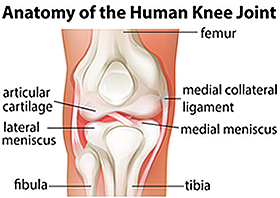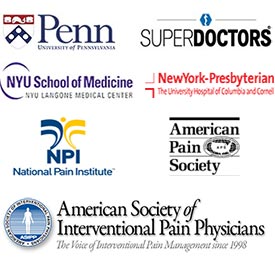Medial Collateral Ligament Knee Injury (MCL) Doctors NYC
 At Manhattan Pain and Sports Associates you’ll get the medial collateral ligament (MCL) injury diagnosis, pain management, and medicla care you need to reduce or eliminate your knee pain. Because when you’re in pain — whether it’s from an accident, age, sporting injury or ailment — you want pain relief. Appropriate and targeted MCL treatment starts with a diagnosis from our MCL knee injury specialists.
At Manhattan Pain and Sports Associates you’ll get the medial collateral ligament (MCL) injury diagnosis, pain management, and medicla care you need to reduce or eliminate your knee pain. Because when you’re in pain — whether it’s from an accident, age, sporting injury or ailment — you want pain relief. Appropriate and targeted MCL treatment starts with a diagnosis from our MCL knee injury specialists.
Medial Collateral Ligament Injury
Four ligaments stabilize your knee:
- Lateral collateral ligament
- Medial collateral ligament
- Anterior cruciate ligament
- Posterior cruciate ligament
All are important to keep your knee working properly, but the medial collateral ligament (MCL) strengthens the knee joint and keeps your knee from bending inward. The MCL attaches your femur, or thigh bone, to your tibia, the weight-bearing shin bone. The MCL is located on the inside part of your knee.
If you injure your medial collateral ligament, you’ll weaken the knee joint and feel the pain immediately. Other symptoms of an MCL injury include:
- A swollen knee
- Sensitivity and pain on the inside part of your knee
- Your knee catches with a click or locks up when you bend it
- Your knee’s unstable, like it might not support your weight
What Causes an MCL Injury
The most common cause of an injury to your medial collateral ligament in Manhattan is a blow to the outside part of your knee. Since the ligament runs along the inside of your knee, pressure from the opposite side can stretch or even tear the MCL. Your knee is not supposed to bend in that direction.
Participating in active running sports — such as football, soccer or even baseball — all increase your risk for an MCL injury. Furthermore, as the knee is a complex, intertwined joint made up of bones, ligaments, tendons and muscle, it’s very likely that if you injure your MCL, you’ll also injure another ligament, such as your anterior cruciate ligament or ACL.
Treatment for a Medial Collateral Ligament Injury
If you injure your MCL you’ll need some TLC. Stay home and wait for the swelling to subside. Keep off your leg and apply ice to your knee. Anti-inflammatory medications often help.
Your best alternative, however, is to get it checked out to make sure there isn’t any worse damage. A pain management doctor can determine how bad your injury is. If your MCL is only stretched, not torn, it most likely will heal sufficiently in time. You may need crutches and/or a knee brace to support your knee to give it time to heal. Once you can bend your knee and put some weight on it, physical therapy can strengthen the knee muscles and get you off the crutches.
If you’ve torn your medial collateral ligament, though, you’ve likely damaged other parts of your knee as well. Sometimes, only surgery can help. To know the extent of your injury, contact your our NYC pain management specialists to have your knee examined and your injury diagnosed.
Pain Relief You Can Count On
If your pain does not subside after a few days of rest, don’t wait…see a doctor. You may need to undergo diagnostic procedures, such as an MRI or CT scan. Only with an accurate diagnosis can you receive the right MCLt pain treatment.
Get the MCL Pain Relief You Need
Your NYC pain management doctor’s goal is to get you back to your normal routine with minimal downtime. After your diagnosis is confirmed, your doctor begins your treatment plan with the most conservative pain relief treatment. You’ll always receive non-invasive pain relief before your doctor turns to more invasive procedures like surgery.
Manhattan Pain and Sports Associates
51 East 25th St, 4th Floor, Ste B
New York, NY 10010
(212) 533-3954



